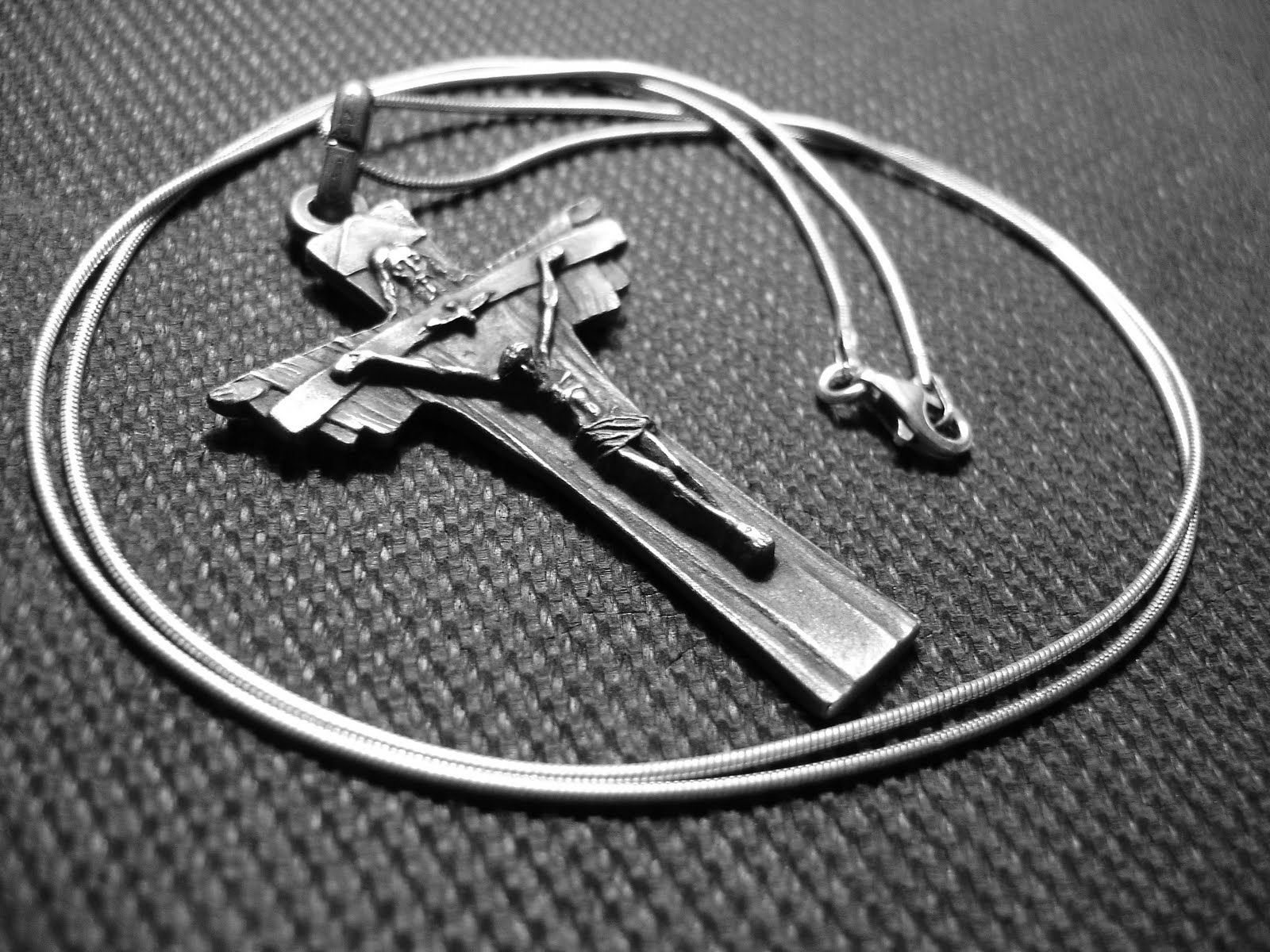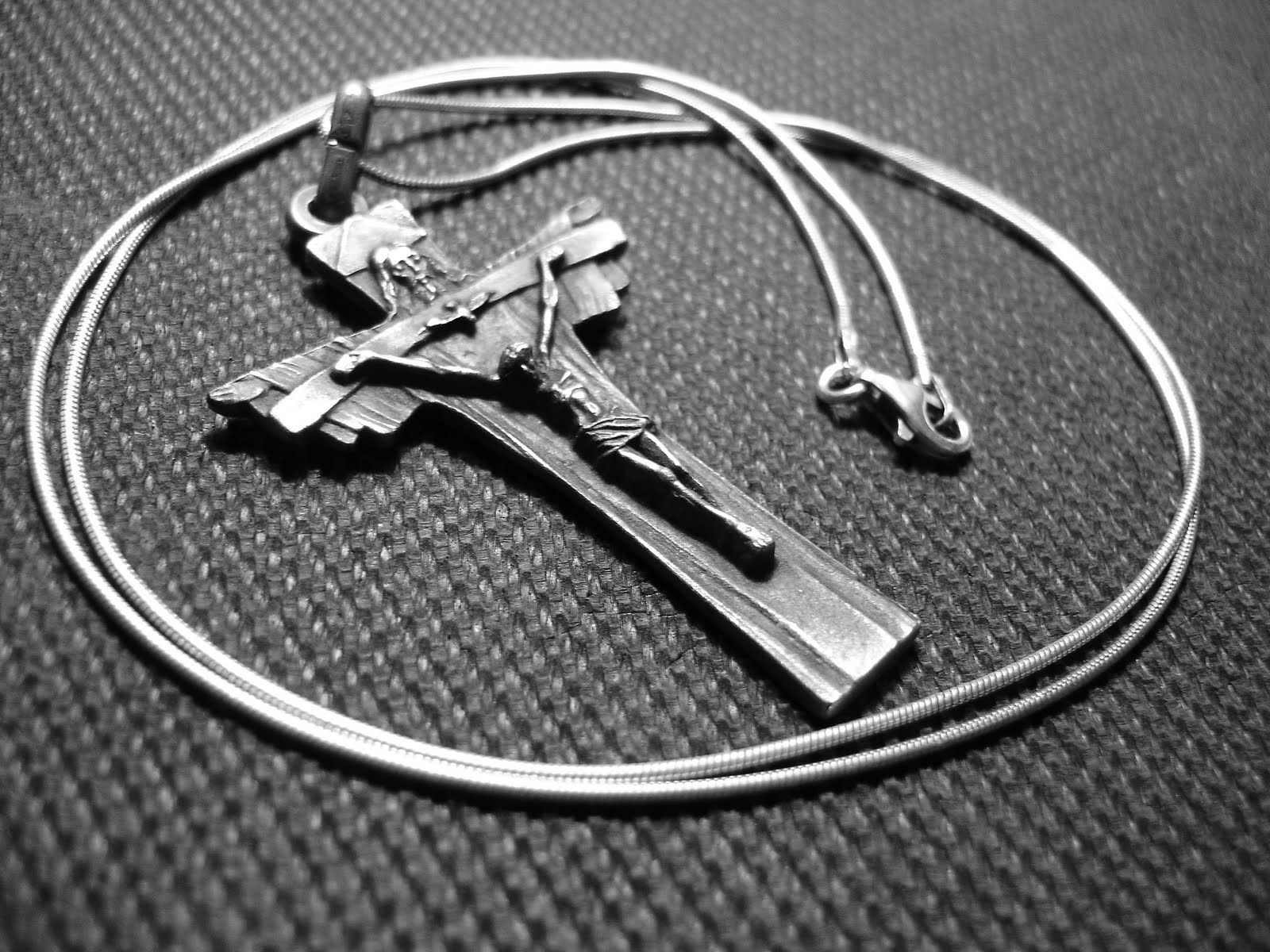 This is a cross that was given to me by a friend when he visited the Vatican, and was blessed by Pope John Paul II. I wear it to this day.
This is a cross that was given to me by a friend when he visited the Vatican, and was blessed by Pope John Paul II. I wear it to this day.
And why is that a critical question, more now than ever before?
As I’ve written here and stated on my wireless internet radio broadcast, BZ’s Berserk Bobcat Saloon Radio Show, what we as Conservatives are facing now isn’t simply a matter of Republican vs Demorat, Conservative vs Leftist. I believe it’s much more fundamental than that.
Bobcat Saloon Radio Show, what we as Conservatives are facing now isn’t simply a matter of Republican vs Demorat, Conservative vs Leftist. I believe it’s much more fundamental than that.
It is literally Good vs Evil.
After having served 41 years in law enforcement, I know what Evil looks like.
I know what Evil smells like, how it moves, how it speaks, what is says, its inflection, its tone, its mannerisms, down to its facial ticks.
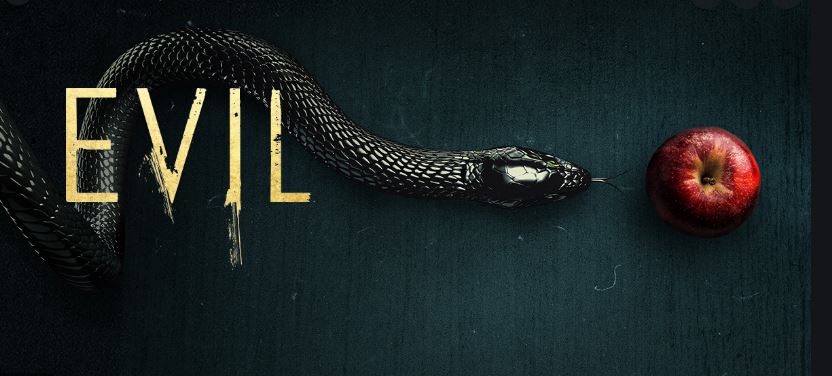 I know how it will lie to you, baldly, nakedly, with no shame, concern, introspection or self-awareness whatsoever — when the truth could save it. Because it’s totally unfamiliar with the truth. Or shame. Or self-examination.
I know how it will lie to you, baldly, nakedly, with no shame, concern, introspection or self-awareness whatsoever — when the truth could save it. Because it’s totally unfamiliar with the truth. Or shame. Or self-examination.
Evil has shot at me four times as a law enforcement officer. I’ve shot back once. But those situations weren’t the worst evil I ever encountered.
I’ve come across evil in a 16-year-old who shot and killed a fellow student in a pizza restaurant robbery where he used to work. His statement to me was: “If the doctors had done a better job, he wouldn’t have died.”
I booked the Thrill Killer, Eric Royce Leonard, who had shot and killed six people in two separate incidents a short distance from each other, on Tuesdays, one week apart, in February of 1991. He had absolutely no affect, as Stan Reed and I took him to the Sacramento County Main Jail.
I arrested a female who had shot and killed her spouse because they were divorcing, and were arguing about who would get the batteries in the TV remote control. She won. When I arrived, she was cooking dinner on the stove because “I was hungry and he didn’t need to eat.”
I arrested any number of pedophiles while assigned to Child Abuse, involving cases with details the likes of which I won’t go into here. But I’m sure you can imagine. One was a priest whom the local diocese moved on me. And I was told to drop.
Evil, I tell you, is a tangible thing and, sadly, those who don’t believe Evil exists are operating under the weight of serious delusion.
So I have some large, weighty, and overarching questions to ask tonight, and I wanted to pose these questions to some of my favorite Conservative fellow talk show hosts, who are also religious, significant, and not faux, pretend, fake or fair-weather Conservatives.
And who are either pastors themselves, or for whom religion plays a significant role in their lives. And they’re not afraid to state it.
I also asked two other pastors to be here tonight, but both declined. I won’t name them because I’m not here to shame, but to ask questions and conduct a discussion.
I want to take everyone on a journey tonight, step-by-step, so we all better understand the core principals at issue in terms of religion in the United States, how they are all interwoven, and why these are so critical considering the state of our nation in 2021.
In terms of answering significant questions, I asked these fellow Conservative talk show hosts to weigh in on my show.
- KEN McCLENTON
- PASTOR SHANNON WRIGHT
- PASTOR RALPH J CHITTAMS, SR
- RANDY PURHAM
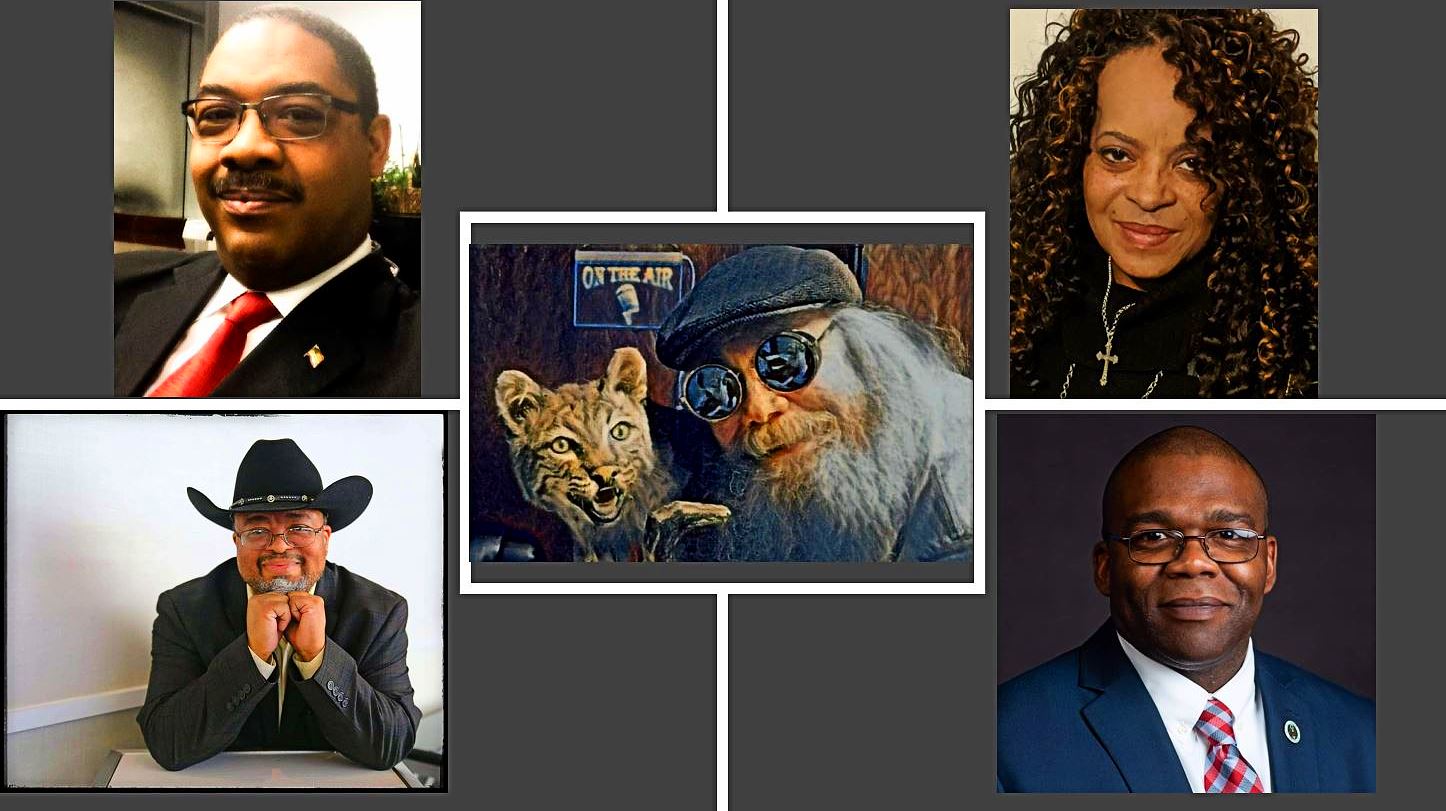 They were kind enough to donate their time and thoughts.
They were kind enough to donate their time and thoughts.
But first, some background and orientation.
Up until a few years ago, I have mostly avoided any direct and concentrated focus on religion, either on my blog or on my radio show, though I would occasionally address an issue.
I do not proselytize, so I do not care to be handled in that manner. I believe that my relationship with God is my own, and does not inherently involve anyone else.
That’s just me. Your mileage may vary.
And so does the nation’s — to the point where I believe we are at a very critical juncture in the history of the United States because, in my opinion, there is a concerted effort to not just belittle those who believe in God, and Christianity, but to remove religion and by dint of that, its believers wholesale.
With one major exception. Islam. But that’s an issue for another time and day.
So first, the bigger questions.
- Is there such a thing as Good?
- Is there such a thing as Evil?
- How have you seen those things played out in your personal lives or surroundings?
Which leads to more Big Question, requiring self-examination, introspection and consideration.
First: do you believe there is a God, and why? What brought you to this conclusion?
We’ve already agreed that Evil exists. So then:
- Is Man inherently Good?
- Or is Man inherently Evil?
Because of my jaundiced background and the things I’ve seen in my life, I’ve believed that Man is inherently Evil — for years. But I somewhat limited my scope, and didn’t really proffer an expanded series of reasons for my thinking this way.
Perhaps I should soften things by saying “people are not inherently Good.”
I didn’t really begin to understand how all of this inexorably links up to philosophies, culture, and then politics — until I heard this video from Dennis Prager. Then everything, for me, began to dovetail.
As a result of this, we’re most definitely seeing our national culture, philosophies and politics moved and warped by what I consider to be belief systems not in keeping with the very survival of the United States of America — and, by extension, the world itself.
And it stems, I believe, from the core belief systems of people.
Dennis Prager asks: “are people born good?”
Like Mr Prager, I say “absolutely not.”
Otherwise why do we need laws? Rules? Regulations? The Ten Commandments?
Couldn’t one say — even if you didn’t believe in God — that the Ten Commandments represent a pretty reasonable framework in which to live your life?
What are your thoughts? Are people born Good?
If you say YES, then where is Dennis Prager wrong?
So we’ve established that there is God.
We’ve established that Man must always strive to be Good, but is not born that way.
That brings me next to a question I posed on my blog back on January 3rd of 2010:
“I was listening to a radio program last week — it really doesn’t matter which one — and a caller indicated that religion was a matter of heart. The host said the opposite: that it was necessary to hold, yes, your religion in your heart. But it was additionally and equally, if not more so, necessary to hold your religion in an edifice, a church.
That made me think, for a moment, about my place and how I hold my own personal religious beliefs.
I am not naturally a “joiner,” per se, and my life doesn’t revolve around the approval of other humans, and it never has. I tend to be a loner by nature and my friends — I’m not really quite that sure that I have even one very close friend at this point in my life, absent my wife.
I have many acquaintances, that is true.
And it’s only in the past, say, five years or so that I’ve even taken time to consider my relationship with God.
But perhaps my eyes were most opened when one of my friends at work, now retired, came back from a European vacation and presented me with an object he’d acquired at the Vatican. It was a cross on a chain, blessed by Pope John Paul II in May of 2004.
Since the moment he gave it to me, I’ve worn it every day. Not because I’m such a pious or sanctified or good man — but instead because it forces me, it reminds me, every morning when I look in the mirror, to remember my place in the Grand Scheme and to actually try to be a better man.
No, I don’t belong to a church nor do I attend weekly or even on Christmas. But neither did Jesus. Wherever he went, He carried His Father.
So where do you carry your beliefs?
Church? Or heart?
And why?“
“I don’t believe in man, but I believe in God. I don’t need the trappings of a church to hold God close. I don’t require the approval of many people in a group to try to be a better man. And I see, day after day, the fallibility of man and the supremacy of God.
I don’t hold the Bible as the ultimate word of God because the Bible is rife with what I consider to be the base motivations of man, to include greed, envy, pride, power, and the politics of a few thousand years ago.
The Bible was vetted by the Council of Nicea, if I have my history correct, and as with any gathering of men, there were the political ramifications of what got into the Bible, and what was excluded.
And that does not even factor in the sometimes poor memory and accuracy of man himself, stories handed down through the ages by those not of first-hand experience.
I don’t believe in man. But I do believe in God.“
So, what are your thoughts?
I’ll next ask this, a question posed by another individual in a story I was recently reading:
“Should church be a museum for saints, or a hospital for sinners?”
Again, what are your thoughts?
That said, has it now become more important to attend a church, to show support for churches, for attendance, for unity, for support, for coherence, in order to illustrate the solidarity of those who are religious — in contrast to those who are secular, and – or want to eliminate religion and demand that religion — and its adherents — have no place in a “modern society” today?
Let’s move into churches themselves, and let’s examine the two issues of politics and religion.
Should politics enter into a topic that pastors address to their congregants?
Or is Brother Marcus Rogers correct when he wrote:
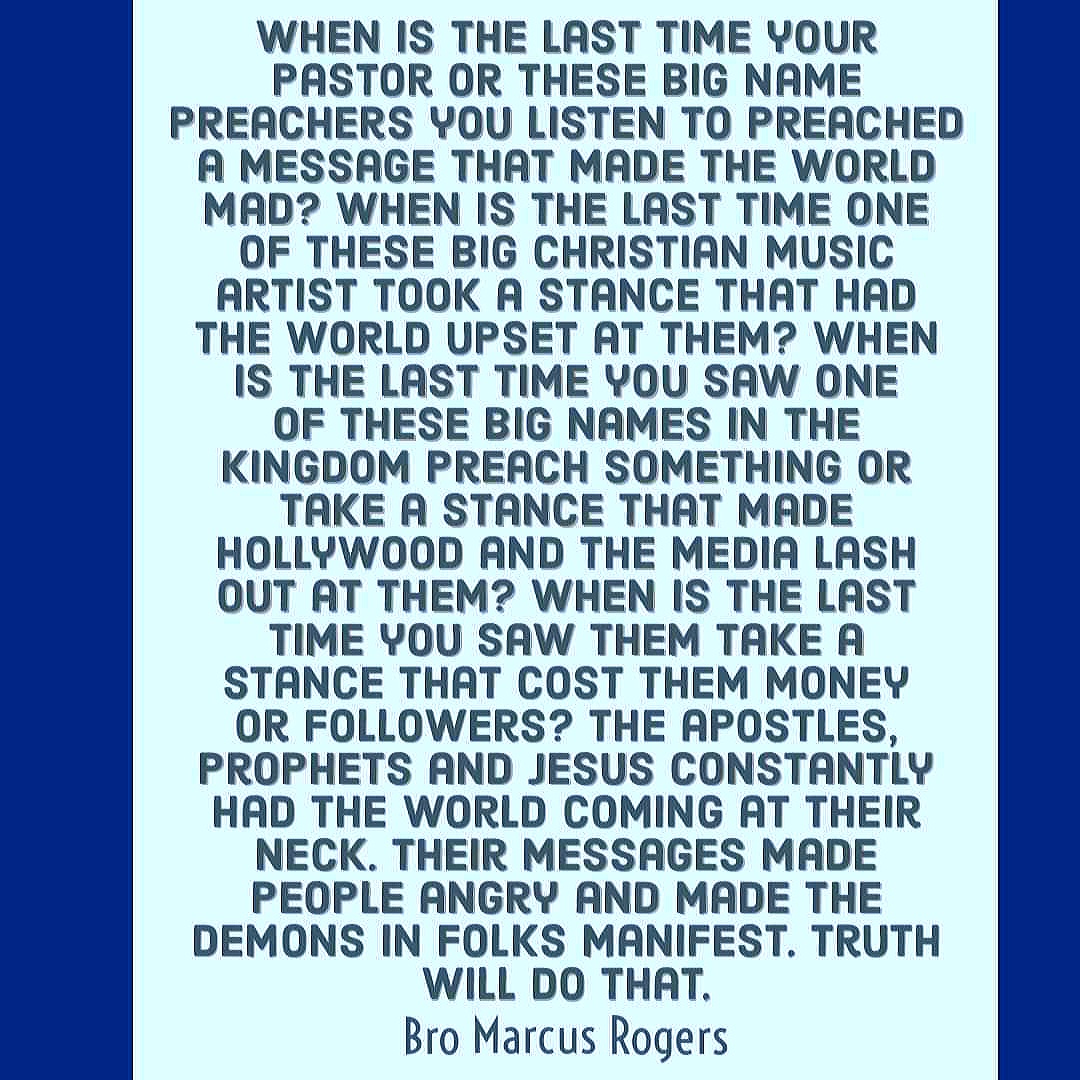 Your thoughts on politics and religion? Do they mix? Should they mix? And if they do, how should they be addressed by church leaders?
Your thoughts on politics and religion? Do they mix? Should they mix? And if they do, how should they be addressed by church leaders?
Because I have another quote from a pastor, regarding politics:
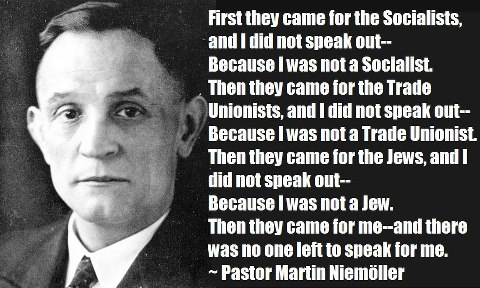 Is it accurate to say that, even if you’re not “interested” in politics, politics are certainly interested in you?
Is it accurate to say that, even if you’re not “interested” in politics, politics are certainly interested in you?
Does Christianity have the luxury of not wanting to be involved in politics in 2021?
Let’s get into some specific stories. Most recently, I found these from our neighbors to the north of us, Canada. Please note how the headline and the story is framed.
Burned churches stir deep Indigenous ambivalence over faith of forefathers
by Leyland Cecco in Toronto, July 4, 2021
After hundreds of unmarked graves were found at Canada’s former Catholic-run residential schools, churches in First Nations territories have been destroyed by suspected arson
For more than a century, the clapboard church set amid rolling hills in western Canada has been a spiritual home to the Upper Similkameen Indian Band.
To build St Anne’s, residents of Chuchuwayha Indian Reserve #2 travelled 40 miles to the closest town, hauling lumber back to their community by horse and wagon.
To reach its pews, generations of congregants would travel miles by foot, past ponderosa pine and sagebrush.
But early last Saturday, thick smoke filled the air and flames ripped through the ageing wooden structure near Hedley in British Columbia. By the time local fire crews arrived, the church had been reduced to a pile of ash.
The answer, it seems again, is burning.
The community’s fire chief said nothing could be done to save the wooden building. Police say the fire that destroyed the church was suspicious and probably deliberately set. It was the fourth Catholic church on First Nations territory destroyed by fire in less than a month.
“The church meant so much to all of us, especially our ancestors,” Carrie Allison, an elder who helped maintain the church, said in a statement. “When your hurt turns to rage it is not healthy for you or your community.”
As Canada grapples with the discovery of more than 1,000 unmarked graves of Indigenous children at the sites of former residential schools, many have directed their grief and anger at the Catholic church, which ran more than half of the schools across the country.
The burning of churches wasn’t limited.
In recent weeks, nearly two dozen churches have been burned or vandalized across the country – eight of which occurred in First Nations territories.
Justin Trudeau joined Indigenous leaders and provincial officials in condemning what are widely suspected to be acts of arson.
We know the arsons have negatively affected the indigenous.
For Allison, a survivor of the Kamloops Indian residential school, the fire has only worsened the pain.
“I think of all our ancestors that helped to build St Anne’s, looking over us and watching all their hard work and the place they cherished burn to the ground,” she wrote. “A lot of us suffered, but this is not how we do things, and this is not our way. It makes me so sick, sad, and I can only hope I do not know you. I feel sorry for you, and I hope you’re satisfied.”
But there was something — as is common with Leftist journalism such as this — left out of the article and the others I saw, entirely. And that’s this. Any proof offered, or any investigation into, the accuracy or validity of the accusations. Who did it? Why? When? Do we know?
And if this is how we act now, why are there any mosques left standing in any portion of the civilized world?
“We’ll burn first, and if you’re lucky, we may ask questions later.”
Then there’s the head of the British Columbia Civil Liberties Association, Harsha Walia who, in response to the church burnings, wrote: “Burn it all down.”
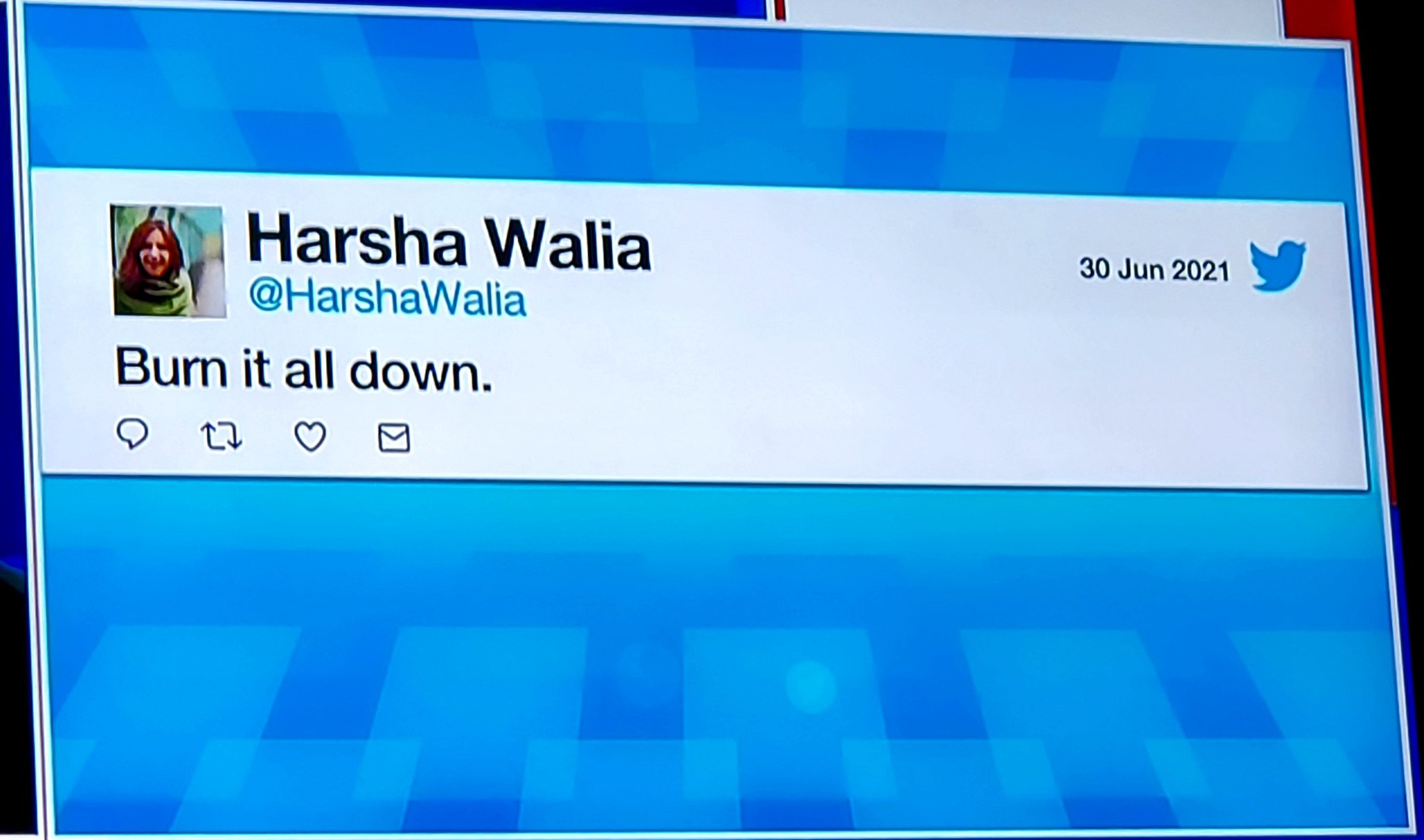 It’s interesting to note that you can’t even see her Tweet unless she personally approves you, of course, because she’s a Leftist coward. So I immured it photographically. And this is who she is.
It’s interesting to note that you can’t even see her Tweet unless she personally approves you, of course, because she’s a Leftist coward. So I immured it photographically. And this is who she is.
 But wait, there’s more.
But wait, there’s more.
We all know what happened to Masterpiece Cake Shop owner Jack Phillips. Multiple times. He’s going back to SCOTUS again.
We all watched this past year as huge warehouse stores, fulfillment centers, businesses owned by large corporations, were allowed to continue to operate under Wuhan-19.
While, literally, Mom and Pop churches were put under orders from opening or, if “allowed” to open, were under mandates not forced on other entities.
While those creating the orders ignored the orders and ate, dined, drank, and vacationed wherever the hell they wanted because they could.
So I point out these additional stories.
Christian Persecution and Genocide Is Worse Now Than “Any Time in History,” Report Says
by Christina Maza, Newsweek, 1-4-18
The persecution and genocide of Christians across the world is worse today “than at any time in history,” and Western governments are failing to stop it, a report from a Catholic organization said.
The study by Aid to the Church in Need said the treatment of Christians has worsened substantially in the past two years compared with the two years prior, and has grown more violent than any other period in modern times.
“Not only are Christians more persecuted than any other faith group, but ever-increasing numbers are experiencing the very worst forms of persecution,” the report said.
The report examined the plight of Christians in China, Egypt, Eritrea, India, Iran, Iraq, Nigeria, North Korea, Pakistan, Saudi Arabia, Sudan, Syria and Turkey over the period lasting from 2015 until 2017. The research showed that in that time, Christians suffered crimes against humanity, and some were hanged or crucified. The report found that Saudi Arabia was the only country where the situation for Christians did not get worse, and that was only because the situation couldn’t get any worse than it already was.
In Africa, the report focused on countries like Sudan, where the government ordered that churches be destroyed, and Nigeria, where ISIS-affiliated groups like Boko Haram have led a surge in attacks on Christians. In Eritrea, hundreds of Christians have been rounded up and imprisoned over the past year because of their faith.
The report also documented numerous case studies in which Christians in countries such as India and Nigeria were murdered or beaten for practicing their faith.
Jewish hate crimes are also up across the world and in the United States. From AEI.org:
Based on 2019 FBI data, Jews were 2.6X more likely than blacks and 2.2X more likely than Muslims to be victims of hate crimes
by Mark Perry, 7-6-21
Members of which of these groups were most likely to be a victim of a hate crime in 2019: Muslims, Blacks, or Jews?
Based on media coverage, you would probably say Muslims or Blacks.
According to a Google news search for the term “hate crimes” along with the name of each of those three groups, there are 291,000 results for “hate crimes” + black, 89,600 results for “hate crimes” + Muslim, and only 67,000 results for “hate crimes” + Jew.
Stop. If you’re searching for unbiased statistical accuracy involving any societal or cultural issue, stay the hell away from Google. They mislead, shove you to false articles, fail to send you anything at all, cover up, or send you only to information that outright lies.
Based on news reports, you might think that blacks were much more likely than Jews to be the victim of a hate crime and that Muslims were somewhat more likely to be hate crime victims compared to Jews.
Hate crime data released last November by the FBI for 2019 reveal that there were 2,391 black/African-American victims of hate crimes, 1,032 Jewish victims, and 227 Muslim victims. Adjusting for the population of each group in 2019 (43.98 million blacks, 7.5 million Jews, and 3.61 million Muslims) the hate crime victimization rates per 100,000 population of each group were 13.8 for Jews, 6.3 for Muslims, and 5.4 for blacks (see chart above). Therefore, adjusted for population by group, American Jews were 2.6 times more likely than blacks to be a victim of a hate crime in 2019, and 2.2 times more likely than a Muslim to be a hate crime victim.
But wait. There are more uncomfortable (for Leftists) truths coming.
The FBI data for 2019 on anti-religion hate crimes also reveal that of the 1,715 victims of anti-religious hate crimes in the US, 1,032 were Jews (60.2% of the total) and 227 victims were Muslims (13.2% of the total). Obviously, since more than half (60.2%) of the anti-religious hate crimes in 2019 were against Jews, there were more anti-religious hate crimes against Jews (1,032) than incidents of hate crimes against all other religious groups combined (683). The FBI data also show that there were more Jewish hate crime victims in 2019 (1,032) than the number of gay men (863) and lesbians (143) who were victims of hate crimes.
That’s information Google and other organizations don’t want you to know.
So tell me, group, “what is the state of religion today in the United States, and why does it matter?”
I found two excellent articles that are essentially saying, to Christians, “wake up.”
Conservative scholar: America must have religious awakening if it is to survive
by Stephen Koks, Lifesite News, 2-7-20
Conservative scholar Charles Murray is not optimistic about the future of the United States.
In an interview with Canadian pro-life activist Jonathon van Maren, Murray, famous for his many books on culture and politics, said the American experiment in constitutional government is “dead as a doornail” and that without a religious awakening, the United States may last only a few more decades.
We as Christians are being sent messages, and they are very loud. Are we listening?
“I think America is showing what post-America looks like,” Murray said. “People who call themselves conservatives … believe things that would horrify the Founders.”
“You cannot have a free society, a society that allows lots of individual autonomy without some outside force that leads people to control the self,” he said.
“The American way of life” is now “meaningless.” America today is “just another rich, powerful country.”
Murray explains that the loss of character and religion is “like the old cartoon where the coyote is chasing the roadrunner and runs off the edge of the cliff and continues running without a problem for a while and then suddenly realizes where he is. He goes crashing to the ground. We have run off the edge of the cliff, and we’re still running great. It’s not going to last very long.”
So what will it take to turn things around? Can they be turned around?
Despite his pessimism, Murray believes that “if you have a resurgence of what used to be known in the United States as a religious great awakening,” then that can “change the behavior of the population in very positive ways[.] … [I]f you have a new upper class that joins in a resurgence of the Judeo-Christian traditions in the United States, that’s going to be great.”
But Murray does not hold out much hope for that happening. Nor does he think it’s likely to happen in Europe.
“I cannot believe that the secularization of society is going to continue indefinitely. We have never had an advanced culture, in the history of the world, that is nearly as secular as contemporary Europe. And I would say that is the test case.”
“Europe is going to degenerate,” he continued. “The increasing Muslim minorities in those countries are probably going to accelerate the exposure of the degeneracy.”
A topic the likes of which most every GOWP purposely ignores.
When pressed for advice on what ordinary Americans should be doing in these times, Murray answered that they should move to small towns and live “the traditional American way of life” and get involved in their communities.
Ultimately, though, he believes that what America needs is “the emergence of a charismatic person who is devoted to the original American founding who is going to attract political support in the way that Ronald Reagan did.”
That person will hopefully be able to restore some of the character and institutions of the United States, he said.
So, question to all: is that what we need? Does such a person exist and if so, who is it?
I end with this article, which I suggest states the issue quite clearly.
If Christians don’t personally engage in politics, it’s all over for America
by Hon. Robert Marshall, former member of the Virginia House of Delegates, 9-19-19
The So-Called Equality Act
On October 30, 2008, Barack Obama said, “We are five days away from fundamentally transforming the United States of America.” The legal policy changes wrought under the Obama Administration paved the way for the so-called Equality Act, HR 5, which passed the U.S. House of Representatives on May 17, 2019 by a vote of 236 to 173. The Equality Act would fundamentally and radically alter Civil Rights Law to prohibit “discrimination” on the basis of “sexual orientation” and “gender identity,” in the same way racial discrimination is prohibited. Analysis by pro-life and pro-family organizations, as well as the U.S. Catholic Bishops, have warned that the Equality Act would:
- Require faith-based hospitals, doctors and nurses to participate in and/or to perform or assist with abortions or lose their medical licenses;
- Require tax funding of all abortions without restrictions;
- Mandate that any entity that provides health care for pregnancy and childbirth be required to provide abortion as a “related medical condition”;
- Force women to share private, intimate spaces with men who “identify” as female including in bathrooms, lockers, schools, hospitals, prisons, gyms, military barracks and homeless shelters;
- Disallow Catholic and private school single sex sports teams from competing against public school sports teams, which will no longer be permitted to have “discriminatory” single sex teams;
- Decertify Catholic and Christian schools from satisfying state compulsory attendance laws if they refuse to adopt LGBTQ policies, treating religious schools as “hate groups” comparable to the Ku Klux Klan;
- Forbid groups like the Knights of Columbus, Catholic Charities and Christian non-profits from receiving community block grants from local governments for housing for the disabled or seniors unless they accommodate the LGBTQ agenda including hiring those who identify as homosexual or transgender;
- Prohibit Catholic schools and parishes from obtaining construction loans from federally chartered banks or savings institutions unless the schools and churches implement the LGBTQ agenda including hiring active homosexual and transgender teachers in same sex “marriages”;
- Remove children from the legal custody of their parents if they try to prevent their minor children from taking cancer-causing, puberty-blocking drugs or cross-sex hormones recommended by school counselors or provided by social welfare agencies;
- End women-only or men-only shelters serving drug addicts, the battered, and the homeless;
- Decertify foster care and adoption agencies which do not place children with homosexual partners;
- Require small businesses owned by Catholics to promote and affirm LGBTQ sexual behavior or face fines and/or loss of their business licenses;
- Remove the tax-exempt status of Catholic churches and agencies if they fail to “celebrate” same-sex “weddings.” The Equality Act would classify churches as “public accommodations” (like hotels and restaurants), prohibited from denying services on account of sexual orientation, in the same manner services cannot now be denied on account of race.
The “Equality Act” is one egregious example of sexual progressives stepping up efforts to exclude from the public square those who live by the moral teachings of Moses and Jesus. Anyone who disagrees or questions the LGBTQ agenda, abortion and “reproductive rights” is described as guilty of depravity, bigotry and hatred, despite our following a faith based on loving God and loving our neighbor.
Catholic Members of Congress Vote for the Equality Act
All 74 Catholic Democrat members of the House who were present, including Catholic Speaker Nancy Pelosi, voted in support of HR 5. Six Catholic Republican congressmen voted “yes,” while 42 Catholic Republican congressmen voted “no.” The Senate companion bill, S. 788, has been co-sponsored by ten Catholic Democrats and one Catholic Republican. (Only four of the Catholic Republican senators and one Catholic Democrat senator have not cosponsored the so-called Equality Act.)
This is indeed an interesting but accurate observation.
Lawyers working for the United States Catholic Conference and various dioceses appear to be more protective of the Church’s tax-exempt status than of the moral principles the Church is ordained to uphold. This is puzzling considering that one of the questions St. Peter will obviously not ask American Catholic bishops in the next life is, “How well did you protect the tax-exempt status of the Church?”
The very tax-exempt status the Church has carefully sought to protect will be significantly eroded if not totally eliminated, financially impacting parishes, schools, hospitals, food pantries, group homes, shelters, soup kitchens, adoption agencies, etc.
The book of Hosea reminds us that, “My people are destroyed for lack of Knowledge.” We must have knowledge of the Word of God, as well as knowledge of the civil world. St. Paul appealed to Caesar on the grounds that he, as a Roman citizen, should not be turned over to the Sanhedrin to be silenced, and Moses grew up in Pharaoh’s household learning the ropes of government so God could rely on him to help the Jewish people.
Likewise, we need to become more knowledgeable about civic affairs and understand that each one of us has an important role to play during this particular time in history. Let us be motivated and remain hopeful, courageous, and persistent in the age-old fight between good and evil playing out today.
I think I can translate that. Christians and pastors can’t afford to ignore politics. To do so places the Sword of Damocles at their own throats.
So what is the state of religion in the United States? Faltering.
And what can be done about it?
Wake up and see what’s really, truly going on around you.
Not what you’d like to have going on around you.
It is, in fact, Good vs Evil.
BZ



